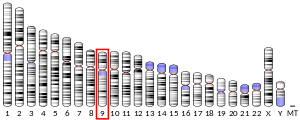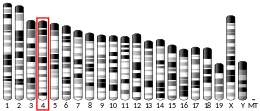KIAA1797
| FOCAD | |||||||||||||||||||||||||
|---|---|---|---|---|---|---|---|---|---|---|---|---|---|---|---|---|---|---|---|---|---|---|---|---|---|
| Identifiers | |||||||||||||||||||||||||
| Aliases | FOCAD, KIAA1797, focadhesin | ||||||||||||||||||||||||
| External IDs | MGI: 2676921 HomoloGene: 9842 GeneCards: FOCAD | ||||||||||||||||||||||||
| |||||||||||||||||||||||||
| |||||||||||||||||||||||||
| Orthologs | |||||||||||||||||||||||||
| Species | Human | Mouse | |||||||||||||||||||||||
| Entrez | |||||||||||||||||||||||||
| Ensembl | |||||||||||||||||||||||||
| UniProt | |||||||||||||||||||||||||
| RefSeq (mRNA) | |||||||||||||||||||||||||
| RefSeq (protein) | |||||||||||||||||||||||||
| Location (UCSC) | Chr 9: 20.66 – 21 Mb | Chr 4: 88.09 – 88.41 Mb | |||||||||||||||||||||||
| PubMed search | [3] | [4] | |||||||||||||||||||||||
| Wikidata | |||||||||||||||||||||||||
| |||||||||||||||||||||||||
KIAA1797 is a protein that in humans is encoded by the KIAA1797 gene.[5]
A specific single-nucleotide polymorphism rs7875153 in KIAA1797 is associated with heart rate.[6]
Gene
KIAA1797 is a protein-coding gene in Homo sapiens. Alternate names for the gene are FLJ20375, OTTHUMP00000069845, and hypothetical protein LOC54914.[5] Located on chromosome 9 at area q21.3,[7] the entire gene including introns and exons is 375,010 base pairs on the plus strand. There are 19 alternative splice variants. Longest variant yields a mRNA of 6117 base pairs.
Expression
KIAA1797 was determined to express ubiquitously at varying levels throughout the human body. Based on the EST profile of Unigene, KIAA1797 expression have been observed in tissues ranging from reproductive to secretory.[8]
mRNA
Predicted secondary mRNA structures in the 5'UTR and the 3'UTR are “ugagaugaacucgguaucuca” and “uccuaagagaggag” respectively. Other possible secondary structures are shown in the table below.
Protein sequence
The main isoform of the human protein is 1801 amino acid long, a total of 200,072 Da.[7]
Two distinct Domain of unknown function(DUF) are found in the sequence.DUF3730 (465-682aa) appears two times in the sequence; this domain family is found in eukaryotes and is typically between 220 and 262 amino acids in length. DUF3028(1213-1801aa). No additional information was provided regarding this DUF.
Homology
KIAA1797 is well conserved in mammals. However, it is also found in non-mammalians with lower sequence identities.
Gene Neighborhood
KIAA1797 is downstream of MLLT3 and upstream of PTPLAD2. MLLT3 is involved with myeloid/lymphoid or mixed-lineage leukemia. PTPLAD2 is a protein tyrosine phosphatase.
Function
The exact function of KIAA1797 is not yet understood by the scientific community. It is, however, found to be a transmembrane proteins.
References
- 1 2 3 GRCh38: Ensembl release 89: ENSG00000188352 - Ensembl, May 2017
- 1 2 3 GRCm38: Ensembl release 89: ENSMUSG00000038368 - Ensembl, May 2017
- ↑ "Human PubMed Reference:".
- ↑ "Mouse PubMed Reference:".
- 1 2 "Entrez Gene: KIAA1797".
- ↑ Melton PE, Rutherford S, Voruganti VS, Göring HH, Laston S, Haack K, Comuzzie AG, Dyer TD, Johnson MP, Kent JW, Curran JE, Moses EK, Blangero J, Barac A, Lee ET, Best LG, Fabsitz RR, Devereux RB, Okin PM, Bella JN, Broeckel U, Howard BV, MacCluer JW, Cole SA, Almasy L (September 2010). "Bivariate genetic association of KIAA1797 with heart rate in American Indians: the Strong Heart Family Study". Hum. Mol. Genet. 19 (18): 3662–71. doi:10.1093/hmg/ddq274. PMC 2928129. PMID 20601674.
- 1 2 AceView NCBI Gene Information AceView Archived April 7, 2006, at WebCite
- ↑ "EST Profile – Hs.283322". National Center for Biotechnology Information, United States National Library of Medicine.
Further reading
- Rose JE, Behm FM, Drgon T, et al. "Personalized smoking cessation: interactions between nicotine dose, dependence and quit-success genotype score". Mol. Med. 16 (7–8): 247–53. doi:10.2119/molmed.2009.00159. PMC 2896464. PMID 20379614.
- Chapuis J, Hot D, Hansmannel F, et al. (2009). "Transcriptomic and genetic studies identify IL-33 as a candidate gene for Alzheimer's disease". Mol. Psychiatry. 14 (11): 1004–16. doi:10.1038/mp.2009.10. PMC 2860783. PMID 19204726.
- Maruyama K, Sugano S (1994). "Oligo-capping: a simple method to replace the cap structure of eukaryotic mRNAs with oligoribonucleotides". Gene. 138 (1–2): 171–4. doi:10.1016/0378-1119(94)90802-8. PMID 8125298.
- Nagase T, Nakayama M, Nakajima D, et al. (2001). "Prediction of the coding sequences of unidentified human genes. XX. The complete sequences of 100 new cDNA clones from brain which code for large proteins in vitro". DNA Res. 8 (2): 85–95. doi:10.1093/dnares/8.2.85. PMID 11347906.



